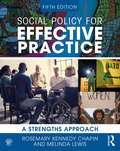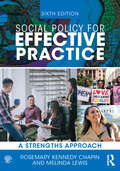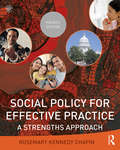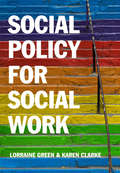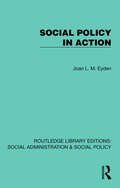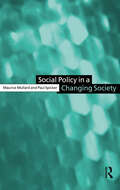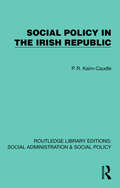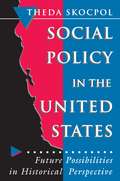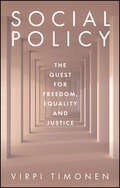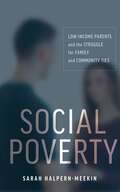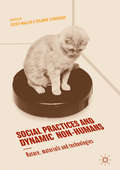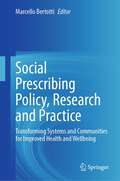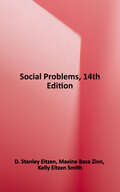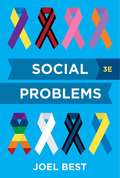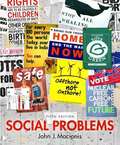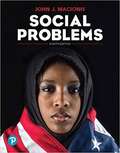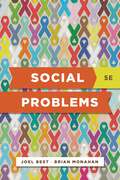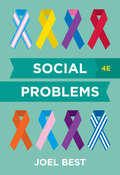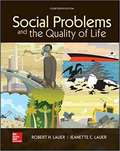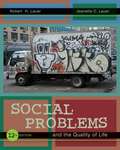- Table View
- List View
Social Policy for Effective Practice: A Strengths Approach
by Rosemary Kennedy Chapin Melinda Kay LewisThe fifth edition of Social Policy for Effective Practice offers a rich variety of resources and knowledge foundations to help social work students understand and contend with the continually evolving social policy landscape that surrounds them. The authors have continued their traditional values-based approach and kept the focus on clients’ strengths to help students position themselves for effective engagement on new fronts where policy threats and outcomes affect clients’ lives in myriad ways. The new edition comprehensively covers the process of defining need, analyzing social policy, and developing policy, and each chapter builds on the practical knowledge and skills forged from previous ones. New to this edition: Thorough examination of new policies, including challenges to the Affordable Care Act, voting rights, immigration, women’s rights, and LGBTQ+ rights, as well as situations involving substance use, mental health, and economic inequality. Expanded coverage of shifting demographics, including population diversity and aging. Increased connections drawn between historical, present, and potential future policy contexts Updated exercises, exhibits, and social media links in-text and an entire suite of web-based tools found through www.routledgesw.com, including complementary reading suggestions and teaching tips, a full library of lecture slides and exam questions, and EPAS guidelines. For use as a resource in foundations generalist social policy courses, either at the baccalaureate or master’s level, the new edition of Social Policy for Effective Practice will challenge students to find areas of policy practice that spark their passion and prepare them to think about and use policy practice as a tool that can lead to the changes they care about.
Social Policy for Effective Practice: A Strengths Approach
by Rosemary Kennedy Chapin Melinda LewisSocial Policy for Effective Practice: A Strengths Approach sharpens students' awareness of social welfare policy and offers a considerable array of resources and knowledge foundations to both understand and thrive within a continually evolving policy landscape. Throughout the text, the authors tell the stories of social workers who impact policy, incorporate frameworks for policy analysis, center social work values and strengths principles, and integrate the series' interactive and downloadable cases to demonstrate policy's relevance and application to practice settings and situations in concrete ways. Students may use the text as an introduction to social policy, a tool for deeper examination of policy topics, and as a lifelong companion for their policy-relevant practice. Now in its sixth edition, the textbook is fully updated to reflect substantial changes in policy arenas such as health care, family economic support, immigration and asylum, criminal justice, housing, reproductive rights, substance use disorder, mental health treatment, and childcare, as well as the implications of the evolving COVID-19 pandemic. With additional support and extensions available at www.routledgesw.com, Social Policy for Effective Practice makes policy relevant, accessible, and meaningful for social work students and is a perfect complement to undergraduate and graduate courses on social policy and practice.
Social Policy for Effective Practice: A Strengths Approach
by Rosemary Kennedy ChapinFor use as a text in foundations generalist social policy courses, either at the baccalaureate or master’s level, this book examines the process of defining need, analyzing social policy, and developing new policy. A clear philosophical base and a common theoretical framework underlie the discussion of each component of the policy process. Each chapter builds on the knowledge foundation provided in previous chapters to equip students with skills necessary for effective policy practice. Four themes are interwoven throughout the book: the importance of thinking critically about social policy, the benefits of using the strengths perspective in policy analysis and development, the critical role social policy plays in all areas of practice, and the absolute responsibility of every social worker to engage in policy practice. Routledgesw.com now contains 6 cases; the Sanchez Case has been revised to include much more policy content. Instructor materials include extra readings, PowerPoints, test questions, annotated links, syllabi, and EPAS guidelines. As with the third edition, instructors can choose chapters relevant to their course and custom publish them at www.routledge.customgateway.com
Social Policy for Effective Practice: A Strengths Approach (2nd edition)
by Rosemary ChapinFor use as a text in foundations generalist social policy courses, either at the baccalaureate or Master "s Level, this book examines the process of defining need, analyzing social policy, and developing new policy. A clear philosophical base and a common theoretical framework underlie the discussion of each component of the policy process. Four themes are interwoven throughout the book: the importance of thinking critically about social policy, the benefits of using the strengths perspective in policy analysis and development, the critical role social policy plays in all areas of practice, and the absolute responsibility of every social worker to engage in policy practice. At www.routledgesw. com/policy, you will find a wealth of resources to help you create a dynamic, experiential introduction to social work for your students.
Social Policy for Social Work
by Robert AdamsSocial Policy for Social Work provides a comprehensive, critical and engaging introduction to social policy for students and practitioners of social work. The text is clearly structured into three parts that cover contexts, policies and issues. The first part explores changing perspectives on social policy and social work and provides an introduction to the broad range of specific policy aspects discussed in part two which include: social security health and community care family and child care criminal justice. Part three focuses on key issues such as tackling divisions and inequalities, the control of services including empowering people receiving services, and future policy trends. Additionally, appendices provide a key to common abbreviations, dates of the main legislation and internet addresses of main information sources on policy and research. Illustrations from practice are included throughout to highlight implications for social work practice. The text focuses on contemporary Britain but also draws examples from European, global and historical contexts wherever appropriate. This exceptional text demonstrates clearly the relevance and implications of social policy for social work practice. It is an essential and practical resource for all students and practitioners in the welfare field.
Social Policy for Social Work, Social Care and the Caring Professions: Scottish Perspectives
by Janine BolgerSince devolution in 1999, social policy within Scotland has burgeoned. The Scottish Parliament has a range of powers in relation to key policy areas including social work, education, health, child care, child protection, law and home affairs, and housing. These powers and the existence of a distinct legal tradition in Scotland means that social work practice has developed a distinctive style, attuned to the particular needs of Scotland. Scottish distinctiveness however, has rarely been properly represented in textbooks on either social policy or social work. This innovative text offers comprehensive coverage of the discipline of social policy and its central relevance to social work, social care and related practice in Scotland. Designed to complement teaching and study associated with the new Honours degree in Social Work (Scottish Executive 2003), it fills a notable gap in the literature on this subject and will be essential reading for students, professionals and academics within a variety of health and social care occupations.
Social Policy for Social Work: Placing Social Work in its Wider Context
by Lorraine Green Karen ClarkeContemporary social work cannot be understood without an appreciation of the broader context of social policy in which it takes place. Such an understanding is increasingly important as social workers are expected to work across institutional, professional and even national boundaries in new ways profoundly affected by the changing global context. This insightful book examines how shifts in the dominant political ideology have affected the nature of welfare provision, the kinds of social problems addressed by policy, and the balance of responsibilities for well-being between individuals, the family, voluntary organizations, the market and the state. It explains the impact of these developments on the organization of social work and on relationships between social workers and service users. The book discusses contested concepts central to social work - such as justice, liberty, equality, difference, need and risk - and illustrates these through a range of examples.The critical analysis provided in this book offers students of social work a crucial foundation for negotiating difficult and sensitive practice situations and defending their profession, providing them with the tools and knowledge to uphold key professional values.
Social Policy in Action (Routledge Library Editions: Social Administration & Social Policy)
by Joan L. EydenSocial policy is never static because both needs and resources alter. It must involve a responsiveness to social change on the part of the agencies involved. Originally published in 1969, this study employs this dynamic approach and sets the subject against a background of democratic involvement. It discusses the fundamental questions of the nature, scope and intent of social policy. Throughout the approach to the subject is integrative. The book explains issues in terms of social policy, not fragmented social policies, in the discussion of common factors and common problems and above all in the realistic appraisal of means and ends in contemporary society.
Social Policy in a Changing Society
by Paul Spicker Maurice MullardSocial Policy in a Changing Society is a critical guide to theories about society, exploring the links between social theory and social policy. It considers a range of interpretations of changes in society, politics and the economy, and assesses their practical implications for social welfare. Social Policy in a Changing Society will be essential reading for undergraduates studying social policy and sociology.
Social Policy in the Irish Republic (Routledge Library Editions: Social Administration & Social Policy)
by P. R. Kaim-CaudleOriginally published in 1967, this book examines the health services, social insurance, social assistance, family allowances and housing in the Irish Republic during the late 20th Century. Discussion of the social services is introduced by an outline of the environment in which social policy operates – the political system, social implications of the demographic characteristics and the country’s economy. The book will be of interest to historians of social policy and social work.
Social Policy in the United States: Future Possibilities in Historical Perspective (Princeton Studies in American Politics: Historical, International, and Comparative Perspectives #172)
by Theda SkocpolHealth care, welfare, Social Security, employment programs--all are part of ongoing national debates about the future of social policy in the United States. In this wide-ranging collection of essays, Theda Skocpol shows how historical understanding, centered on governmental institutions and political alliances, can illuminate the limits and possibilities of American social policymaking both past and present. Skocpol dispels the myth that Americans are inherently hostile to social spending and suggests why President Clinton's health care agenda was so quickly attacked despite the support of most Americans for his goals.
Social Policy: The Quest for Freedom, Equality and Justice
by Virpi TimonenConcepts like freedom, equality and justice have many uses – and even more misuses. In seeking to manage an increasingly complex world, it is more important than ever to think carefully about the meaning of such concepts which are central to policy debates and integral to implementing effective social policy around the world. This concise and readable book is a guide to those essential social policy concepts. In addition to freedom, equality and justice, the book covers concepts like social risks and rights that are critical for understanding welfare states, and examines social policies through the lenses of power, recognition and investment. It also reflects on the role of social policy in addressing the biggest challenges that humanity faces in the twenty-first century, including the megatrends of inequality and climate change. Drawing on key works and examples from diverse contexts, this book will be of interest to undergraduate and postgraduate students of social policy, sociology, social work and other social sciences, as well as researchers, policymakers, practitioners and activists looking for an accessible introduction to the heart of social policy.
Social Poverty: Low-Income Parents and the Struggle for Family and Community Ties
by Sarah Halpern-MeekinHow low-income people cope with the emotional dimensions of poverty Could a lack of close, meaningful social ties be a public—rather than just a private—problem? In Social Poverty, Sarah Halpern-Meekin provides a much-needed window into the nature of social ties among low-income, unmarried parents, highlighting their often-ignored forms of hardship. Drawing on in-depth interviews with thirty-one couples, collected during their participation in a government-sponsored relationship education program called Family Expectations, she brings unprecedented attention to the relational and emotional dimensions of socioeconomic disadvantage. Poverty scholars typically focus on the economic use value of social ties—for example, how relationships enable access to job leads, informal loans, or a spare bedroom.However, Halpern-Meekin introduces the important new concept of “social poverty,” identifying it not just as a derivative of economic poverty, but as its own condition, which also perpetuates poverty. Through a careful and nuanced analysis of the strengths and limitations of relationship classes, she shines a light on the fundamental place of core socioemotional needs in our lives. Engaging and compassionate, Social Poverty highlights a new direction for policy and poverty research that can enrich our understanding of disadvantaged families around the country.
Social Power and Political Influence
by James T. TedeschiThe nature of social power, the ability of individuals to affect the behavior and belief of others, is central to any understanding of the dynamics of change in our society. It is therefore surprising that social scientists, and especially social psychologists, have devoted relatively little attention to the subject and have accumulated relatively little knowledge about it. But this gap may be more apparent than real argues James T. Tedeschi; there has in fact been a great deal of research on many aspects of interpersonal influence. What is missing is the kind of consensus about an operational definition of the concept of power that would bring this work usefully into focus. The purpose of Social Power and Political Influence is to bring together the best work of scholars from many disciplines in order to organize, develop, evaluate, and interpret scientific theories of social, political, and economic power. The contributors are drawn from anthropology, political science, sociology, and social psychology. They illustrate a variety of approaches, ranging from ethnographic case studies to mathematically formalized models. Presenting theory and methods, these chapters treat in provocative and creative ways such important problems as the factors that affect the use of power and the nature of response to its use, the linkages that affect the flow of power between individuals and social systems, the consequences of attributions of power by actors and observers, and the implications of trust as an alternative to explicit influence. This in-depth scholarly sampling of research and theory will be of great interest to everyone concerned with the scientific study of social and political power and the influence processes. The interdisciplinary nature of the topic itself and of the work represented here make Social Power and Political Influence an important contribution for students and scholars in many fields, from social psychology, political science and sociology to communications, management science, and economics.
Social Practices and Dynamic Non-Humans: Nature, Materials and Technologies
by Yolande Strengers Cecily MallerThe robots are coming! So too is the ‘age of automation’, the march of ‘invasive’ species, more intense natural disasters, and a potential cataclysm of other unprecedented events and phenomena of which we do not yet know, and cannot predict. This book is concerned with how to account for these non-humans and their effects within theories of social practice. In particular, this provocative collection tackles contemporary debates about the roles, relations and agencies of constantly changing, disruptive, intelligent or otherwise 'dynamic' non-humans, such as weather, animals and automated devices. In doing so contributors challenge and take forward existing understandings of dynamic non-humans in theories of social practice by reconsidering their potential roles in everyday life. The book will benefit sociology, geography, science and technology studies, and human- (and animal-) computer interaction design scholars seeking to make sense of the complex entanglement of non-human phenomena and things in the performance of social practices.
Social Prescribing Policy, Research and Practice: Transforming Systems and Communities for Improved Health and Wellbeing
by Marcello BertottiThis contributed volume uniquely enhances our knowledge and understanding of social prescribing internationally. It fills a gap in the literature by engaging critically with the concept of social prescribing across different countries, to contribute to more general lessons that can be used in a variety of contexts.The book discusses the strengths and weaknesses in the design, implementation, evaluation, policy, and practice of social prescribing. Each chapter has a framework structured around three key themes: the key policies underpinning social prescribing, the evaluation and research evidence base, and practice including the design and implementation of social prescribing. Country-based chapters focus on the development of social prescribing and include case studies of different social prescribing models in England, Wales, Portugal, Germany, Republic of Ireland, Canada and Singapore. Three chapters are dedicated to England given the wide-ranging contribution of this country to the development of social prescribing. Among the topics covered:An international perspective on social prescribing: introductionThe role of social prescribing in addressing health inequalitiesImplementing social prescribing schemesConclusion: The present and future of social prescribingSocial Prescribing Policy, Research and Practice: Transforming Systems and Communities for Improved Health and Wellbeing encapsulates the wide-ranging evidence on social prescribing in a single volume. The book should appeal to a broad and diverse audience including researchers interested in the evaluation and effective design and implementation of social prescribing and community health intervention more generally; researchers and commissioners of public health interventions; healthcare professionals involved in the development of health interventions in primary, secondary and tertiary care; the local health economy which includes local government departments (e.g., public health, housing, employment, social services); professionals working in the Voluntary, Community and Social Enterprise (VCSE) sector; policy makers; and university students (including medical students).
Social Problems
by D. Stanley Eitzen Kelly Eitzen Smith Maxine Baca ZinnSocial Problems examines social structure and the underlying features of the social world to provide students a coherent framework for understanding social problems. Employing a consistently sociological approach, authors D. Stanley Eitzen, Maxine Baca Zinn, and Kelly Eitzen Smith show readers how social problems are interrelated and highlight society’s role in their creation and perpetuation. The Fourteenth Edition has been updated with coverage of major events of the last several years in order to help students achieve a balanced understanding of contemporary social problems. Revel is Pearson’s newest way of delivering our respected content. Fully digital and highly engaging, Revel replaces the textbook and gives students everything they need for the course. Informed by extensive research on how people read, think, and learn, Revel is an interactive learning environment that enables students to read, practice, and study in one continuous experience – for less than the cost of a traditional textbook.
Social Problems
by Joel BestUpdated with nine new end-of-chapter case studies and more than 50 new boxed examples, the Third Edition of Joel Best's Social Problems elucidates the complex, competitive process through which social problems emerge, paying particular attention to how resources and rhetoric affect each stage of the process. Drawing on social constructionist theory, Best shows how activists, experts, and their opponents engage in claimsmaking, and how the media then report on these claims, prompting public reaction and driving policy. In order to help students connect theory to everyday life, Joel Best fills the book with colorful examples and real-world case studies.
Social Problems
by John J. MacionisMacionis's book is the only social problems text that explains how society frames social problems and solutions through politics. The text analyzes social issues and policies, using the concepts of sociological theory and the everyday language of politics. It also helps students understand the attitudes and values that define the political spectrum in the United States. Once students know how social problems are defined by our society through politics, and how the policies to solve these problems are developed, they can become involved in solving social problems through activism and political involvement.
Social Problems
by John J. MacionisMacionis's book is the only social problems text that explains how society frames social problems and solutions through politics. The text analyzes social issues and policies, using the concepts of sociological theory and the everyday language of politics. It also helps students understand the attitudes and values that define the political spectrum in the United States. Once students know how social problems are defined by our society through politics, and how the policies to solve these problems are developed, they can become involved in solving social problems through activism and political involvement.
Social Problems (Fifth Edition)
by Joel Best Brian MonahanNot your parents’ social problems textbook Joel Best, author of the best-selling Damned Lies and Statistics, and new coauthor Brian Monahan offer a fresh approach to the social problems course. Rather than overloading students with details and data, the book focuses on how and why particular conditions come to be constructed as social problems. Each chapter explores a different stage of the construction process, ending with a rich case study that applies the concepts to a contemporary issue. In this way, the authors equip students with the tools needed to analyze any social problem they encounter in the media. New to this edition: Short, boxed features in every chapter tackle current issues such as the controversy over Drag Queen Story Hour, pharmaceutical pollution, and the concussion crisis in youth sports. All-new end-of-chapter case studies apply the topic of the chapter to hot-button issues like abortion policy after Dobbs v. Jackson and the rise of cancel cultures. A thoroughly updated Chapter 5 on the media includes a new discussion of news values and how these criteria have changed due to the shift to digital delivery. A new end-of-chapter case explores “The Blame Game,” or how the media not only distribute claims but can also become the target of claims. This purchase offers access to the digital ebook only.
Social Problems (Fourth Edition)
by Joel BestAn engaging, unconventional guide for how to think about social problems An important alternative to traditional texts in its field, Social Problems explains how and why particular conditions come to be constructed as social problems. By evaluating the construction process, Joel Best, author of the best-selling Damned Lies and Statistics, equips students with the tools they need to analyze any social problem they encounter in the media. The Fourth Edition has been updated with new examples and case studies on timely topics such as campus sexual assault, the opioid epidemic, and fake news, helping students connect sociological theory to everyday life.
Social Problems (Thirteenth Edition)
by D. Stanley Eitzen Kelly Eitzen Smith Maxine Baca ZinnTaking a conflict approach, Social Problems, 13e examines social problems, how they are interrelated to other problems, and society's role in their creation and perpetuation. This text addresses interesting subjects, such as corporate crime, urban decay, poverty and the changing economy. The thirteenth edition focuses more deliberately on five major themes: the structural sources of social problems; the role of the United States in global social problems; the centrality of class, race, gender, sexuality, and disability as sources of division, inequality, and injustice; the critical examination of society; and solutions to social problems. MySocLab is an integral part of the Eitzan / Zinn / Smith program. Key learning applications include MySocLab Videos, Social Explorer and Sociology in Focus Blog. Teaching & Learning Experience Personalize Learning - MySocLab is an online homework, tutorial, and assessment program. It helps students prepare for class and instructor gauge individual and class performance. Improve Critical Thinking - Chapter organization follows a logical framework that traces a problem from its origin to solution. Engage Students - International, national, and personal examples help students understand issues better. Explore Theory - Major sociological theories within context of social problem are discussed. Understand Diversity - Features help students think globally about defining a solution to social problems. Support Instructors - A number of Instructor Resources including PowerPoint Presentations, MyTest Test Bank, and Instructor's Manual.0205949185 / 9780205949182 Social Problems Plus NEW MySocLab with eText -- Access Card Package Package consists of: 0205206530 / 9780205206537 NEW MySocLab with Pearson eText -- Valuepack Access Card 1-095 Pub 0205881882 / 9780205881888 Social Problems
Social Problems And The Quality Of Life
by Robert H. LauerSocial Problems and the Quality of Life is a thought-provoking text providing thorough coverage of the social problems that most acutely impact the quality of our lives. Chapters define what a social problem is, and address a number of questions crucial to understanding social problems. Learning is supported through several pedagogical features such as Global Comparison boxes and public policy sections, as well as study questions, internet resources, and ample review materials. These sources all combine to paint a complete picture of how to understand the unique social problems of today’s world.
Social Problems and the Quality of Life
by Jeanette C. Lauer Robert H. LauerSocial Problems and the Quality of Life focuses on the ways in which social problems affect the quality of life. It begins by defining social problems and discussing the tools needed to understand and respond to problems. It then moves on to an examination of specific problems in terms of: the nature and extent of the problem; how the problem affects people's quality of life; the structural and social psychological factors that cause and tend to perpetuate the problem; and what can be done to resolve the problem. Along with the discussion, a number of learning aids makes this text personal, practical, and an interactive learning experience.
